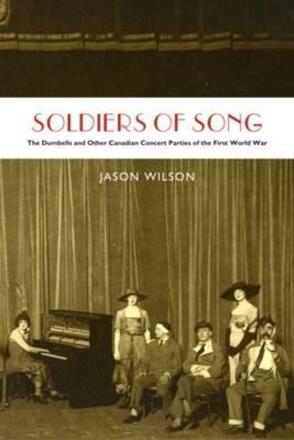
Soldiers of Song
The Dumbells and Other Canadian Concert Parties of the First World War
La description
The seeds of irreverent humour that inspired the likes of The Wayne and Shuster Hour and Monty Python were sown in the trenches of the First World War, and The Dumbells—concert parties made up of fighting soldiers—were central to this process. Soldiers of Song tells their story. Lucky soldiers who could sing a song, perform a skit, or pass as a “lady,” were taken from the line and put onstage for the benefit of their soldier-audiences. The intent was to bolster morale and thereby help soldiers survive the war. The Dumbells’ popularity was not limited to troop shows along the trenches. The group managed a run in London’s West End and became the first ever Canadian production to score a hit on Broadway. Touring Canada for some twelve years after the war, the Dumbells became a household name and made more than twenty-five audio recordings. If nationhood was won on the crest of Vimy Ridge, it was the Dumbells who provided the country with its earliest soundtrack. Pioneers of sketch comedy, the Dumbells are as important to the history of Canadian theatre as they are to the cultural history of early-twentieth-century Canada.
Reviews
In this fascinating study ... we are shown how, as the war continued, the traditional content based on the Music Hall led to a growth in the darker side of comedy which arose from the trench experience.... This most enjoyable book is a welcome addition to our knowledge of the everyday life at the Front.
- Bob Wyatt, The Western Front Association Stand To!
This rich cultural study details how Canada’s long music hall tradition strengthened morale on the Western Front. This isn’t always a nostalgic view, for the performances mirrored the racism as well as the moral and gendered ambiguities of the age. But the Dumbells’ humour nurtured a style that anticipated The Wayne and Shuster Hour, Monty Python, even Saturday Night Live. From these pages one can almost hear the songs and laughter of a generation at war.
- Geoff Hayes, University of Waterloo, co-editor (with Mike Bechthold and Matt Symes) of Canada and the Second World War: Essays in Honour of Terry Copp